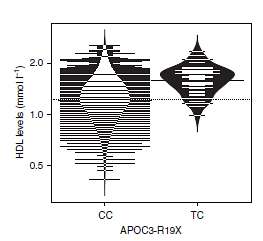Genetics that protects your heart

(Medical Xpress)—Researchers have found a key piece of the puzzle as to why an isolated population in Greece may live healthy lives. They have found that a genetic variant known to protect the heart is 40 times more common in this small Greek population than in other European populations.
The protective genetic variant, known as R19X, was first seen in the Amish population in 2008. This study demonstrates the same protective behaviour of the R19X variant and shows that the increased frequency of this variant is not just isolated to the Amish community.
The residents of Anogia and surrounding Mylopotamos villages live in mountainous villages on Crete. Anecdotally throughout Greece, these people are known to be strong and live long and healthy lives, despite a diet rich in animal fat that should cause health complications.
"The Mylopotamos villages residents have the same rate of diabetes as the general Greek population, but do not suffer from disease complications," says Professor Eleftheria Zeggini, lead author of the study from the Wellcome Trust Sanger Institute. "Genetic studies like this can help us begin to understand why this is."
The team, which includes collaborators at the Anogia Medical Centre and Harokopio University, took samples from more than 1,200 people living in Anogia and the surrounding villages (MANOLIS cohort). They then used DNA microchip technology to survey more thoroughly regions of the genome that have relatively rare variants that can disrupt protein function.
They found that R19X, a genetic variant in the gene APOC3, was far more common in this population than in other European populations. This variant decreases triglyceride levels, a blood fat that increases risk of heart disease, and increases levels of high density lipoproteins also known as 'good cholesterol', lowering risk of heart disease.
In other European populations, this R19X variant is found in 0.05 per cent of people. But in the MANOLIS cohort, it is found in two per cent of the population.
"Our work exemplifies the importance of studying these isolated populations," says Dr Ioanna Tachmazidou, first author from the Wellcome Trust Sanger Institute. "APOC3 is a gene that is relevant to all populations. This type of study can increase the pace of new therapeutic treatments against cardiovascular and metabolic disease."
Studying founder populations, or isolated populations, such as the MANOLIS cohort is extremely important. These populations empower the study and search of rare, clinically important genetic variants associated with complex disease. The MANOLIS cohort is named in honour of Manolis Giannakakis, 1978-2010.
More information: "A rare functional cardioprotective APOC3 variant has risen in frequency in distinct population isolates." Ioanna Tachmazidou, et al. Nature Communications 2013. DOI: 10.1038/ncomms3872
















